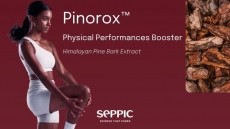Red wine polyphenols plus zinc and vitamin E may aid muscle performance and recovery: Pilot data

Scientists reported that supplementation using Seppic’s branded Sepifit Protect ingredient resulted in significantly lower levels of creatine kinase, compared to placebo, following a pain induction protocol used to mimic physical exertion.
Participants in the placebo group also displayed decreases in muscular power capacity, but these declines were not seen in the Sepifit Protect (SPro) group, according to data published in NutraFoods.
“From a user perspective, the efficacy of SPro was perceived by the subjects to be superior to placebo with respect to performance, physical condition and sensations of muscle soreness. These results reinforce the previous in vitro data and highlight SPro as being a promising active complex for muscle protection during physical exertion,” wrote Catherine Kern and Christine Garcia, both of whom work for Seppic in France.
The ingredient
SEPPIC launched Sepifit Protect 2016. A spokesperson for the company told NutraIngredients-USA: "This 'soft launch' confirmed the interest of its customers, and while we had initial commercial interest and success, the plan was to run the placebo controlled pilot study to offer a more complete ingredient with validated efficacy.
"We are now excited to present our new clinical results and offer new science to sport nutrition and wellness brands. It is our goal to develop more science in the future across all our ingredients to continue answering high standards and providing innovation to the industry."
Study details
Kern and Garcia recruited 30 healthy men aged between 18 and 40 to participate in their pilot study. All of the men exercised regularly (1.5-4.5 hours per week for at least 3 months). Participants were randomly assigned to receive 135 mg per day of the red wine polyphenols, zinc and vitamin E combination or placebo (maltodextrin) for 12 days. All of the men completed an International Physical Activity Questionnaire-Short Form (IPAQ-SF) at the start and end of the study. Twenty-nine men completed the study, which included a pain induction protocol at the end. The protocol included two different exercises: A series of little hurdle jumps (40 cm) and a series of down-below jumps (drop jump).
Results showed that creatine kinase (CK) levels were 70% lower in the active group, compared to placebo. Specifically, CK levels increased by 10.5 IU per liter in the active group, compared to an average of 35.7 IU per liter in the placebo group.
In addition, Kern and Garcia reported that muscular power capacity decreased by only 1.1 cm in the Sepifit Protect group, compared to a decrease of 2.3 cm in the placebo group, “corresponding to a 52% less decrease in the active group compared to the placebo group. The difference between groups was borderline significant (p=0.086),” they added.
Data from the IPAQ-SF also showed a better perception of performance, physical condition and muscle soreness in the Sepifit Protect group.
“These results reinforce the data already obtained in vitro and highlight SEPIFIT Protect as a promising complex to optimize muscle recovery after physical exertion, and thus, to maintain physical activity and performance,” they wrote. “Confirmation in a further clinical study with a larger panel of subjects and expanded kinetic measurement is required.”
Source: NutraFoods
(2020) 1:149-158 doi: 10.17470/NF-020-0021
“Supplementation with SEPIFIT Protect, a complex of a natural red wine extract, vitamin E and zinc, improves exercise recovery in healthy men”
Authors: C. Kern, C. Garcia















